Nicolas Cage and the Temple of Contractual Obligation
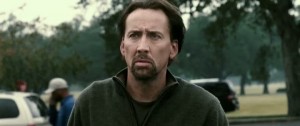 When my girlfriend and I moved to Columbus, Ohio, we did not have much time to find a place to live. We settled on a location that was converted from a post office to a building full of large lofts. The apartment was huge, but it had quite a few deficits. There were no lights in the living room, which was an issue because the ceiling was 20 feet high and we were on the ground floor (meaning the sun could only provide light at an angle). On top of that, the only window we had was also 20 feet high, facing an alleyway. The only way to bring fresh air into the place was near the bottom of the window, which opened out onto the alleyway.* Was this full-length window pretty? Of course it was. Was it practical? Not at all.
When my girlfriend and I moved to Columbus, Ohio, we did not have much time to find a place to live. We settled on a location that was converted from a post office to a building full of large lofts. The apartment was huge, but it had quite a few deficits. There were no lights in the living room, which was an issue because the ceiling was 20 feet high and we were on the ground floor (meaning the sun could only provide light at an angle). On top of that, the only window we had was also 20 feet high, facing an alleyway. The only way to bring fresh air into the place was near the bottom of the window, which opened out onto the alleyway.* Was this full-length window pretty? Of course it was. Was it practical? Not at all.
 I was reminded of that apartment and, specifically, that window while watching Roger Donaldson’s Seeking Justice. In that thriller set in New Orleans, one character breaks into an apartment through the front window that slides up high enough for him to enter without even having to duck. In this case, it wasn’t even pretty; if anything, the entire movie plays like an ad for a tourist bureau trying to get people to leave New Orleans. And, in a way, Seeking Justice (known overseas less awkwardly as Justice**) is the perfect analogy for the recent career of Nicolas Cage.
I was reminded of that apartment and, specifically, that window while watching Roger Donaldson’s Seeking Justice. In that thriller set in New Orleans, one character breaks into an apartment through the front window that slides up high enough for him to enter without even having to duck. In this case, it wasn’t even pretty; if anything, the entire movie plays like an ad for a tourist bureau trying to get people to leave New Orleans. And, in a way, Seeking Justice (known overseas less awkwardly as Justice**) is the perfect analogy for the recent career of Nicolas Cage.
 Notoriously caught in a financial battle with the IRS, Cage has been taking roles in whatever comes his way; quality and release date be damned. However, instead of most name actors with fiduciary issues, like Wesley Snipes or Christian Slater (who referred to one of his recent films as a CG, i.e. cashgrab***), Cage clearly has a stipulation in his contracts that says his films must receive a theatrical release. That’s why Cage has been the lead in five films in the last 16 months, and you’ve likely only been aware of two or three of them. Their order of release does not reflect the order in which they were shot, or that they were even filmed during this decade. In January 2011, there was Season of the Witch. In April, there was Drive Angry. In September, there was Trespass. In February 2012, there was Ghost Rider: Spirit of Vengeance. And now, just finishing up its mandatory two-week run, there is Seeking Justice.
Notoriously caught in a financial battle with the IRS, Cage has been taking roles in whatever comes his way; quality and release date be damned. However, instead of most name actors with fiduciary issues, like Wesley Snipes or Christian Slater (who referred to one of his recent films as a CG, i.e. cashgrab***), Cage clearly has a stipulation in his contracts that says his films must receive a theatrical release. That’s why Cage has been the lead in five films in the last 16 months, and you’ve likely only been aware of two or three of them. Their order of release does not reflect the order in which they were shot, or that they were even filmed during this decade. In January 2011, there was Season of the Witch. In April, there was Drive Angry. In September, there was Trespass. In February 2012, there was Ghost Rider: Spirit of Vengeance. And now, just finishing up its mandatory two-week run, there is Seeking Justice.
 Most of these movies should have gone direct-to-video; especially considering the way they were packaged, but Cage’s name was the only factor getting in the way. These films are generally in profit before they even shoot, with the international rights pre-sold, and very complicated layers of co-financing and deal-making that have nothing to do with making movies. That’s true even of those with such meager inspiration as Cage’s last five (or really every movie he’s made since 2005’s Lord of War). In my review of Bad Lieutenant: Port of Call New Orleans, I went into quite a bit of detail on how the entire movie was a “one-for-them” for director Werner Herzog, and everything else had to do with random details coming together, such as producer Edward Pressman owning the Bad Lieutenant title, and producer Avi Lerner once again taking advantage of New Orleans tax breaks. Whether the movie appears complete or coherent is irrelevant. And, as with Seeking Justice, where almost every character has a scene where they talk about how New Orleans has become a cesspool and is rife with crime, Bad Lieutenant: POCNO is hardly a positive ad for New Orleans tourism. The film is filled with degraded property, floods and disreputable people. The only business these films are likely to bring into New Orleans is to moving companies that are trying to get all of the remaining residents out of there.
Most of these movies should have gone direct-to-video; especially considering the way they were packaged, but Cage’s name was the only factor getting in the way. These films are generally in profit before they even shoot, with the international rights pre-sold, and very complicated layers of co-financing and deal-making that have nothing to do with making movies. That’s true even of those with such meager inspiration as Cage’s last five (or really every movie he’s made since 2005’s Lord of War). In my review of Bad Lieutenant: Port of Call New Orleans, I went into quite a bit of detail on how the entire movie was a “one-for-them” for director Werner Herzog, and everything else had to do with random details coming together, such as producer Edward Pressman owning the Bad Lieutenant title, and producer Avi Lerner once again taking advantage of New Orleans tax breaks. Whether the movie appears complete or coherent is irrelevant. And, as with Seeking Justice, where almost every character has a scene where they talk about how New Orleans has become a cesspool and is rife with crime, Bad Lieutenant: POCNO is hardly a positive ad for New Orleans tourism. The film is filled with degraded property, floods and disreputable people. The only business these films are likely to bring into New Orleans is to moving companies that are trying to get all of the remaining residents out of there.
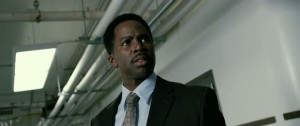 And even if only 20 percent of this were accurate, why would a distribution company want to pick up the film for release? The films have usually played in every territory in the world except the US, so earning no international money, which is 2/3 of the final gross of most American films, is moot. And the movies generally fall within the range that the studios don’t want to touch, above $15 million but below $50 million, where it would just be cheaper to bury it than throw more than the budget in marketing at the film. So it’s up to the few remaining independents like Lions Gate, Millennium and Anchor Bay to provide a platform. But of those three, only Lions Gate can open a film on a large scale. So when Anchor Bay buys Seeking Justice, just as with other Anchor Bay releases like After.Life (with Liam Neeson, Christina Ricci and Justin Long); The Son of No One (with Al Pacino, Tracy Morgan, Channing Tatum, Katie Holmes and Juliette Binoche); and Texas Killing Fields (with Sam Worthington, Chloe Moretz and Jessica Chastain), the only guarantee that the heavy-duty cast brings with them is that the movie will get screened for critics a few days before it opens in 30 or so theaters, with approximately 44 cents of marketing behind it. There will be no TV ads or promotional tours and a DVD and/or VOD/PPV that may occur simultaneously with the theatrical. It’s true that Magnolia often uses the same strategy (and it’s why their theatrical releases are more intended to promote the DVD). But Magnolia picks up niche and genre films, and Anchor Bay just picks up the leftovers that no one else wants that may have spent three or four years picking up shelf mold.
And even if only 20 percent of this were accurate, why would a distribution company want to pick up the film for release? The films have usually played in every territory in the world except the US, so earning no international money, which is 2/3 of the final gross of most American films, is moot. And the movies generally fall within the range that the studios don’t want to touch, above $15 million but below $50 million, where it would just be cheaper to bury it than throw more than the budget in marketing at the film. So it’s up to the few remaining independents like Lions Gate, Millennium and Anchor Bay to provide a platform. But of those three, only Lions Gate can open a film on a large scale. So when Anchor Bay buys Seeking Justice, just as with other Anchor Bay releases like After.Life (with Liam Neeson, Christina Ricci and Justin Long); The Son of No One (with Al Pacino, Tracy Morgan, Channing Tatum, Katie Holmes and Juliette Binoche); and Texas Killing Fields (with Sam Worthington, Chloe Moretz and Jessica Chastain), the only guarantee that the heavy-duty cast brings with them is that the movie will get screened for critics a few days before it opens in 30 or so theaters, with approximately 44 cents of marketing behind it. There will be no TV ads or promotional tours and a DVD and/or VOD/PPV that may occur simultaneously with the theatrical. It’s true that Magnolia often uses the same strategy (and it’s why their theatrical releases are more intended to promote the DVD). But Magnolia picks up niche and genre films, and Anchor Bay just picks up the leftovers that no one else wants that may have spent three or four years picking up shelf mold.
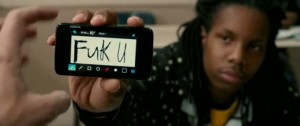 Seeking Justice is one of those Cage movies that was shot last decade, in 2009 (an internet search by Cage’s character accidentally reveals this). And, as with the other four films, it’s unbelievably easy to find parallels to Cage’s career. Cage plays an English teacher and, as he’s attempting to explain Shakespeare he says, “He’s using words to create emotions,” which is the exact opposite of what Cage has been doing as an actor. Instead, he’s been creating emotions with no motivation, and the words he speaks are incidental.
Seeking Justice is one of those Cage movies that was shot last decade, in 2009 (an internet search by Cage’s character accidentally reveals this). And, as with the other four films, it’s unbelievably easy to find parallels to Cage’s career. Cage plays an English teacher and, as he’s attempting to explain Shakespeare he says, “He’s using words to create emotions,” which is the exact opposite of what Cage has been doing as an actor. Instead, he’s been creating emotions with no motivation, and the words he speaks are incidental.
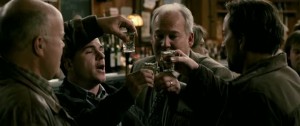 As with Drive Angry, Seeking Justice is kind of a walk-through for Cage. Yes, his haircut is awful in a new, outstanding way, and there’s the occasional bizarre face he makes, combined with a vocal outburst that comes out of nowhere. But his energy flags, and it’s everyone around him who has to do the lifting within the generic genre trappings. But, unlike Drive Angry‘s director Patrick Lussier, Roger Donaldson has no interest in pushing boundaries and does his best to skate away from any interesting moment whenever possible. Of course, that’s why Seeking Justice is watchable for as long as it is; it’s just so average, following the revenge path to the letter. Cage’s wife, January Jones, is raped and beaten, and Cage is approached by the mysterious Simon, played by Guy Pearce, about having someone else take care of the problem. Because even if the cops catch the assailant, he won’t do much time, and that’s if he gets convicted. And, just as the movie begins to explore the darker aspects of such a pact; especially as Cage is guilted into paying the brutality forward to the next criminal assigned by Simon (not one Simon Says joke in the entire film?) to be eliminated, Donaldson tries to fool the audience with a twist that simplifies everything around it and undermines it completely.
As with Drive Angry, Seeking Justice is kind of a walk-through for Cage. Yes, his haircut is awful in a new, outstanding way, and there’s the occasional bizarre face he makes, combined with a vocal outburst that comes out of nowhere. But his energy flags, and it’s everyone around him who has to do the lifting within the generic genre trappings. But, unlike Drive Angry‘s director Patrick Lussier, Roger Donaldson has no interest in pushing boundaries and does his best to skate away from any interesting moment whenever possible. Of course, that’s why Seeking Justice is watchable for as long as it is; it’s just so average, following the revenge path to the letter. Cage’s wife, January Jones, is raped and beaten, and Cage is approached by the mysterious Simon, played by Guy Pearce, about having someone else take care of the problem. Because even if the cops catch the assailant, he won’t do much time, and that’s if he gets convicted. And, just as the movie begins to explore the darker aspects of such a pact; especially as Cage is guilted into paying the brutality forward to the next criminal assigned by Simon (not one Simon Says joke in the entire film?) to be eliminated, Donaldson tries to fool the audience with a twist that simplifies everything around it and undermines it completely.
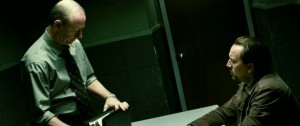 What’s wrong with Cage having to deal with the consequences of his actions? Why settle for arbitrary action sequences and amateur sleuthing? And, just as the movie opens with an embarrassingly obvious scene of exposition (two characters who are the longtime best friends of Cage and Jones ask them, “So how did you guys meet?”), it ends in an abandoned mall with a laborious explanation by a talking killer and further villainous actions cleared up by a trusting local detective who can sweep things under the rug, despite Cage already having been set up as a killer on the run by the press. Woe is the flunky who had to write up and file that report while the wise old detective attempts to stand in front of cameras explaining the situation.
What’s wrong with Cage having to deal with the consequences of his actions? Why settle for arbitrary action sequences and amateur sleuthing? And, just as the movie opens with an embarrassingly obvious scene of exposition (two characters who are the longtime best friends of Cage and Jones ask them, “So how did you guys meet?”), it ends in an abandoned mall with a laborious explanation by a talking killer and further villainous actions cleared up by a trusting local detective who can sweep things under the rug, despite Cage already having been set up as a killer on the run by the press. Woe is the flunky who had to write up and file that report while the wise old detective attempts to stand in front of cameras explaining the situation.
 Luckily for Ghost Rider: Spirit of Vengeance, no sense of reality is required or expected. When your hero is a guy with a flaming head, police action is only going to get in the way. And the producers were smart enough to hire the guys who directed the Crank series, Mark Neveldine and Brian Taylor, to take over for the writer/director for the first Ghost Rider (and one of the producers for the sequel) Mark Steven Johnson. That move made sure none of Johnson’s competent mediocrity would get in the way of whatever absurd violent nonsense Neveldine/Taylor would come up with.
Luckily for Ghost Rider: Spirit of Vengeance, no sense of reality is required or expected. When your hero is a guy with a flaming head, police action is only going to get in the way. And the producers were smart enough to hire the guys who directed the Crank series, Mark Neveldine and Brian Taylor, to take over for the writer/director for the first Ghost Rider (and one of the producers for the sequel) Mark Steven Johnson. That move made sure none of Johnson’s competent mediocrity would get in the way of whatever absurd violent nonsense Neveldine/Taylor would come up with.
 However, Neveldine/Taylor were obligated to deliver a PG-13 film (which was the very problem that prompted their departure from Jonah Hex). The notion of limiting the Crank guys to a PG-13 is more obscene than anything they could have come up with on their own. And, though the budget had been reduced to $75 million from the previous film’s $110 million, one would think that by shooting in Romania, home of many a DTV Seagal/Snipes/Van Damme film, would make up the difference. But, unless money doesn’t go as far in Romania as it used to, this might be a case of what Avi Lerner’s former partner Elie Samaha got sued out of the industry for doing, procuring the budget from outside investors based on one announced figure, but then actually making the film for a lot less and pocketing the rest. Lerner had nothing specifically to do with Ghost Rider: SOV, but the template is certainly there. This template is one that has quite clearly been followed in the past by Ghost Rider investor Ashok Amritraj who worked with Samaha on 14 films, including Battlefield Earth, which was the film at the center of Samaha’s lawsuit.
However, Neveldine/Taylor were obligated to deliver a PG-13 film (which was the very problem that prompted their departure from Jonah Hex). The notion of limiting the Crank guys to a PG-13 is more obscene than anything they could have come up with on their own. And, though the budget had been reduced to $75 million from the previous film’s $110 million, one would think that by shooting in Romania, home of many a DTV Seagal/Snipes/Van Damme film, would make up the difference. But, unless money doesn’t go as far in Romania as it used to, this might be a case of what Avi Lerner’s former partner Elie Samaha got sued out of the industry for doing, procuring the budget from outside investors based on one announced figure, but then actually making the film for a lot less and pocketing the rest. Lerner had nothing specifically to do with Ghost Rider: SOV, but the template is certainly there. This template is one that has quite clearly been followed in the past by Ghost Rider investor Ashok Amritraj who worked with Samaha on 14 films, including Battlefield Earth, which was the film at the center of Samaha’s lawsuit.
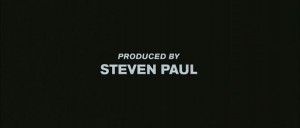 The other key name in the Ghost Rider producing team and the “Elie Samaha Venn diagram” is Steven Paul, who has as bad a track record as Samaha ever did. Paul is famous for being the world’s youngest playwright on record (12 years old); the youngest agent (he started the Crystal Sky agency at 18); and the most youthful writer/producer/director (he made Falling in Love Again in 1980, when he was 20). His first public exposure was as an actor in a theatrical adaptation of Kurt Vonnegut’s Happy Birthday, Wanda June. And, one can assume from his 1982 adaptation of Vonnegut’s novel Slapstick****, that his creative maturity ceased back when he wrote his first play.
The other key name in the Ghost Rider producing team and the “Elie Samaha Venn diagram” is Steven Paul, who has as bad a track record as Samaha ever did. Paul is famous for being the world’s youngest playwright on record (12 years old); the youngest agent (he started the Crystal Sky agency at 18); and the most youthful writer/producer/director (he made Falling in Love Again in 1980, when he was 20). His first public exposure was as an actor in a theatrical adaptation of Kurt Vonnegut’s Happy Birthday, Wanda June. And, one can assume from his 1982 adaptation of Vonnegut’s novel Slapstick****, that his creative maturity ceased back when he wrote his first play.
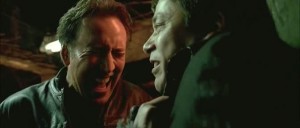 Paul’s next few films were producing his brother Stuart’s vanity projects Emanon and Fate before moving into a mix of direct-to-video soft-core porn and kids’ flicks (though, unfortunately, never a combination of the two) until he finally stumbled upon his magnum opus. And he blessed us all by writing and producing Baby Geniuses. That film, with its non-stop pandering, disastrous editing and constantly unintended creepiness seems to be a perfect synthesis of Steven Paul’s work. That he would go on to make the worst-ever version of The Three Musketeers (2001’s Musketeer), make a sequel to Baby Geniuses, and top it off with Karate Dog, should have finished him in big budget films. But somehow in 2007, despite failing to get Rob Schneider’s directorial debut into theaters (Big Stan), Paul managed to procure Bratz and the first Ghost Rider film. This explains the fact that Paul was responsible for Ghost Rider 2, which both panders to kids by being a PG-13, but flirts with danger by hiring two guys known for their outrageousness to direct it.
Paul’s next few films were producing his brother Stuart’s vanity projects Emanon and Fate before moving into a mix of direct-to-video soft-core porn and kids’ flicks (though, unfortunately, never a combination of the two) until he finally stumbled upon his magnum opus. And he blessed us all by writing and producing Baby Geniuses. That film, with its non-stop pandering, disastrous editing and constantly unintended creepiness seems to be a perfect synthesis of Steven Paul’s work. That he would go on to make the worst-ever version of The Three Musketeers (2001’s Musketeer), make a sequel to Baby Geniuses, and top it off with Karate Dog, should have finished him in big budget films. But somehow in 2007, despite failing to get Rob Schneider’s directorial debut into theaters (Big Stan), Paul managed to procure Bratz and the first Ghost Rider film. This explains the fact that Paul was responsible for Ghost Rider 2, which both panders to kids by being a PG-13, but flirts with danger by hiring two guys known for their outrageousness to direct it.
 Of course, playing both of those cards means the result will be satisfying to neither audience. And so Ghost Rider never reaches the heights of lunacy it should, which ought to be near the Shane Black level*****. A line of dialogue where one of the villains (though not the one who looks like Kirk Cameron put on an Ethan Hawke wig) proclaims “The prophecy says the ritual will take place …” tells you that this movie was entirely dictated by location. He could have said the ritual would take place in the middle of Times Square and it would still end up looking like it was shot in an anonymous Romanian nightclub. The movie goes far enough to waste Idris Elba in a totally incomprehensible role where he is either a religious figure with glowing eyes, or a guy who knows Parkour and can satisfy the “magical negro” role showing the Ghost Rider where he needs to be and when, and occasionally offer Cage a sip of 2,000 year old wine (“It might be good on a salad”).
Of course, playing both of those cards means the result will be satisfying to neither audience. And so Ghost Rider never reaches the heights of lunacy it should, which ought to be near the Shane Black level*****. A line of dialogue where one of the villains (though not the one who looks like Kirk Cameron put on an Ethan Hawke wig) proclaims “The prophecy says the ritual will take place …” tells you that this movie was entirely dictated by location. He could have said the ritual would take place in the middle of Times Square and it would still end up looking like it was shot in an anonymous Romanian nightclub. The movie goes far enough to waste Idris Elba in a totally incomprehensible role where he is either a religious figure with glowing eyes, or a guy who knows Parkour and can satisfy the “magical negro” role showing the Ghost Rider where he needs to be and when, and occasionally offer Cage a sip of 2,000 year old wine (“It might be good on a salad”).
 You get the feeling that the wind was taken out of Ghost Rider 2 when Drive Angry was released, because they’re basically the same movie. Cage is in a sub-Evil Dead-ish role as an indestructible good-guy demon trying to get back at Satan for stealing a child, only Lussier wasn’t held back by a PG-13 rating. Neveldine/Taylor don’t come up with much that might have been visually interesting, anyway. (Ghost Rider-vision is just as bad an idea as Jonah Hex-vision was.) This is true, even though they do provide the greatest Twinkie joke ever devised. So when Elba says to Cage that he must “confess the one thing that is most difficult for you to talk about,” you get the feeling that because no one on set was allowed to say “Cage’s haircut,” the unilateral answer would be, “We just wanted a big paycheck, and this movie will only be entertaining by accident.”
You get the feeling that the wind was taken out of Ghost Rider 2 when Drive Angry was released, because they’re basically the same movie. Cage is in a sub-Evil Dead-ish role as an indestructible good-guy demon trying to get back at Satan for stealing a child, only Lussier wasn’t held back by a PG-13 rating. Neveldine/Taylor don’t come up with much that might have been visually interesting, anyway. (Ghost Rider-vision is just as bad an idea as Jonah Hex-vision was.) This is true, even though they do provide the greatest Twinkie joke ever devised. So when Elba says to Cage that he must “confess the one thing that is most difficult for you to talk about,” you get the feeling that because no one on set was allowed to say “Cage’s haircut,” the unilateral answer would be, “We just wanted a big paycheck, and this movie will only be entertaining by accident.”
 It would be nice if Joel Schumacher’s Trespass were as entertaining by accident as it could have been. But, other than a stark reminder that it’s never too late to have your hopes dashed by the promise of a Joel Schumacher film, it doesn’t deliver. Trespass, which has Cage as a nerdy diamond salesman and Nicole Kidman as his wife being ambushed in their home by a gaggle of masked criminals, shows lots of evidence of never being finished, further backed up by just how much exposition is crammed into the opening minutes. And because it was produced by Avi Lerner.
It would be nice if Joel Schumacher’s Trespass were as entertaining by accident as it could have been. But, other than a stark reminder that it’s never too late to have your hopes dashed by the promise of a Joel Schumacher film, it doesn’t deliver. Trespass, which has Cage as a nerdy diamond salesman and Nicole Kidman as his wife being ambushed in their home by a gaggle of masked criminals, shows lots of evidence of never being finished, further backed up by just how much exposition is crammed into the opening minutes. And because it was produced by Avi Lerner.
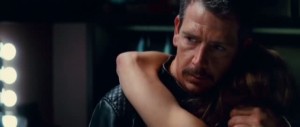 Now, as a semi-relevant aside, this entire article was spurred by****** my reaction to an episode of the bad-movie podcast How Did This Get Made? where long-time professional actor/writer/producers Jason Manzoukis (The Dictator, Portlandia, Children’s Hospital) and Paul Scheer (Human Giant, Piranha 3D) marveled at the fact that Trespass made only $25,000 on a budget of $35 million. Manzoukis and Scheer (and his wife June Diane Raphael, who is a co-host, as well that week’s guest, actress Rachael Harris) should know better. They’ve been in the business long enough to know that release dates are constantly changing, and no film is above being dumped onto 500 screens in August/April/January. The fact that Scheer and Manzoukis were bewildered that Trespass played at the Toronto Film Festival in September 2011 and was on DVD by the beginning of November (with the brief theatrical release in between) seems disingenuous. It’s as if they were overreacting for effect. Scheer, Manzoukis and Harris have been in enough independent movies to know that when the indie market dried up, it meant that hundreds of movies that used to receive a small release now go straight-to-DVD, and the Millennium/Anchor Bay formula would be seen as a bonus.
Now, as a semi-relevant aside, this entire article was spurred by****** my reaction to an episode of the bad-movie podcast How Did This Get Made? where long-time professional actor/writer/producers Jason Manzoukis (The Dictator, Portlandia, Children’s Hospital) and Paul Scheer (Human Giant, Piranha 3D) marveled at the fact that Trespass made only $25,000 on a budget of $35 million. Manzoukis and Scheer (and his wife June Diane Raphael, who is a co-host, as well that week’s guest, actress Rachael Harris) should know better. They’ve been in the business long enough to know that release dates are constantly changing, and no film is above being dumped onto 500 screens in August/April/January. The fact that Scheer and Manzoukis were bewildered that Trespass played at the Toronto Film Festival in September 2011 and was on DVD by the beginning of November (with the brief theatrical release in between) seems disingenuous. It’s as if they were overreacting for effect. Scheer, Manzoukis and Harris have been in enough independent movies to know that when the indie market dried up, it meant that hundreds of movies that used to receive a small release now go straight-to-DVD, and the Millennium/Anchor Bay formula would be seen as a bonus.
 Even if they didn’t know why a movie like Trespass didn’t open in 2,000 theaters, one minute of research on their part would have cleared it up. Lerner is one name that gives you a clue, as well as his frequent producing partner Boaz Davidson. Davidson started out directing Israeli sex comedies in the 1970s; specifically, the popular Lemon Popsicle series (pre-Porky’s, which has the same cynical use of nostalgia), before being convinced by Cannon Films/Golan Globus to come to America to remake the first Lemon Popsicle film as The Last American Virgin. Cannon made its brief fortune in Chuck Norris and Charles Bronson films of the 1980s before flaming out when they bought the rights to Superman IV and ran out of money mid-production. Their style of business is clearly the blueprint for Elie Samaha et. al, and Davidson (who like Menahem Golan and Yoram Globus, is from Palestine, Samaha is from Lebanon). It is the main overlap between the two.
Even if they didn’t know why a movie like Trespass didn’t open in 2,000 theaters, one minute of research on their part would have cleared it up. Lerner is one name that gives you a clue, as well as his frequent producing partner Boaz Davidson. Davidson started out directing Israeli sex comedies in the 1970s; specifically, the popular Lemon Popsicle series (pre-Porky’s, which has the same cynical use of nostalgia), before being convinced by Cannon Films/Golan Globus to come to America to remake the first Lemon Popsicle film as The Last American Virgin. Cannon made its brief fortune in Chuck Norris and Charles Bronson films of the 1980s before flaming out when they bought the rights to Superman IV and ran out of money mid-production. Their style of business is clearly the blueprint for Elie Samaha et. al, and Davidson (who like Menahem Golan and Yoram Globus, is from Palestine, Samaha is from Lebanon). It is the main overlap between the two.
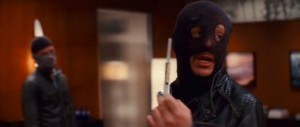 Davidson worked with Samaha on his first five or so films. But that doesn’t mean he should be blamed for the mess that Samaha created. While Samaha was busy fudging numbers on his Franchise Pictures projects, probably films that should have gone DTV were they not so “overpriced,” Davidson and Lerner (who have worked together on 141 films since 1995, including Christian Slater’s cashgrab film Lies & Illusions) went from low-budget action to producing virtually every movie in the last 15 years that has had distribution problems. Starting with the behind the scenes disaster of Wild Side (which left director Donald Cammell so distraught that he killed himself) all the way to 88 Minutes, Lonely Hearts, The Son of No One, etc. Davidson appears to be responsible for these films with big names (Al Pacino, Christopher Walken, Salma Hayek and John Travolta) that you’ve, for some reason, never heard of before you saw them one Sunday afternoon on cable. Davidson is even the overlap for Nicolas Cage, being the producer of the film where Cage’s financial problems began, with 2006’s remake of The Wicker Man (which Cage also produced) through to Drive Angry.
Davidson worked with Samaha on his first five or so films. But that doesn’t mean he should be blamed for the mess that Samaha created. While Samaha was busy fudging numbers on his Franchise Pictures projects, probably films that should have gone DTV were they not so “overpriced,” Davidson and Lerner (who have worked together on 141 films since 1995, including Christian Slater’s cashgrab film Lies & Illusions) went from low-budget action to producing virtually every movie in the last 15 years that has had distribution problems. Starting with the behind the scenes disaster of Wild Side (which left director Donald Cammell so distraught that he killed himself) all the way to 88 Minutes, Lonely Hearts, The Son of No One, etc. Davidson appears to be responsible for these films with big names (Al Pacino, Christopher Walken, Salma Hayek and John Travolta) that you’ve, for some reason, never heard of before you saw them one Sunday afternoon on cable. Davidson is even the overlap for Nicolas Cage, being the producer of the film where Cage’s financial problems began, with 2006’s remake of The Wicker Man (which Cage also produced) through to Drive Angry.
 What does that all have to do with Trespass? Well, it certainly explains its final result, with every scene featuring two or three minutes of the masked villains waving their guns around at Cage/Kidman, cursing at them and threatening to hurt their daughter. It’s so routine that it’s as if Schumacher showed his final cut to Lerner and said, “Avi, look, I put together a thing!” “You mean you finished the movie?” “No, it’s not a movie, it’s a thing.”*******
What does that all have to do with Trespass? Well, it certainly explains its final result, with every scene featuring two or three minutes of the masked villains waving their guns around at Cage/Kidman, cursing at them and threatening to hurt their daughter. It’s so routine that it’s as if Schumacher showed his final cut to Lerner and said, “Avi, look, I put together a thing!” “You mean you finished the movie?” “No, it’s not a movie, it’s a thing.”*******
 It’s not cruel to call Trespass “a thing,” because it isn’t like there was a lot of care put into the film. It’s shot in splotchy-vision, there are enormous strange gaps in the story (how did Cage’s daughter escape that second time?) and frequent red herrings (Mom’s kidney!) that do nothing but pad the running time to the contractual length of 90 minutes. The actors, like Cam Gigandet (who you hire because you don’t think Josh Hartnett will be quite bland enough) basically stand around waiting for the movie to end. Occasionally, someone gets hit on the head or poisoned—
It’s not cruel to call Trespass “a thing,” because it isn’t like there was a lot of care put into the film. It’s shot in splotchy-vision, there are enormous strange gaps in the story (how did Cage’s daughter escape that second time?) and frequent red herrings (Mom’s kidney!) that do nothing but pad the running time to the contractual length of 90 minutes. The actors, like Cam Gigandet (who you hire because you don’t think Josh Hartnett will be quite bland enough) basically stand around waiting for the movie to end. Occasionally, someone gets hit on the head or poisoned— but quickly recovers from their momentary coma to try to leave the house, before being caught once again.******** In other words, Trespass could have been made for $74 (or as a stage play, as not much was done to the house). And there would be little visual difference. Besides, it’s very difficult to sympathize with Cage’s character—seeing as, despite his financial issues, he has “an aesthetic safe” in his house. And yet, at the same time, the movie is rooting for Cage to defraud an insurance company; which is, of course, the best way to keep your family together. Cage has moments of amusing nerdy rage here and there—especially a hilariously overacted scene during a fire. But Schumacher, who turned an intriguing premise like the “Let’s experience death for a few minutes” of Flatliners into pretty actors bathed in shadows that look like they’re emanating from an underground pool, doesn’t have a good premise to work with. Your mind will wander watching it as mine did.
 Maybe it won’t wander in the same direction as I did. I started thinking about the characters in terms of comedian Patton Oswalt’s bit about going to look at a new house with his wife and finding that the owners weren’t ready, because they were in the middle of an orgy. When Oswalt spots a guy who is far too young to be among these 40 year-olds, he remarks that “This kid has, ‘We needed a 14th’ Craigslist hook-up written all over him.” I imagine Kidman, Cage and the other actors standing around waiting for their 14th to show up, and making Trespass to pass the time.
Maybe it won’t wander in the same direction as I did. I started thinking about the characters in terms of comedian Patton Oswalt’s bit about going to look at a new house with his wife and finding that the owners weren’t ready, because they were in the middle of an orgy. When Oswalt spots a guy who is far too young to be among these 40 year-olds, he remarks that “This kid has, ‘We needed a 14th’ Craigslist hook-up written all over him.” I imagine Kidman, Cage and the other actors standing around waiting for their 14th to show up, and making Trespass to pass the time.
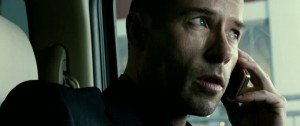 * If you think that such a window would be perfect enticement for criminals, you’d be right. After the first attempted break-in, where the thief was deterred by my waking up and as he was attempting to climb through the open window, I asked him, “Can I help you with something?” After that, we only ever had the window open when we were at home and awake.
* If you think that such a window would be perfect enticement for criminals, you’d be right. After the first attempted break-in, where the thief was deterred by my waking up and as he was attempting to climb through the open window, I asked him, “Can I help you with something?” After that, we only ever had the window open when we were at home and awake.
 **Seeking Justice sounds like a thriller about the perils of filling out paperwork, and how that prevents the common man from having to file lawsuits. There hasn’t been such a riveting title since the German-made, Chicago-shot, Die Hard-ish action movie from 1986 called Zoning.
**Seeking Justice sounds like a thriller about the perils of filling out paperwork, and how that prevents the common man from having to file lawsuits. There hasn’t been such a riveting title since the German-made, Chicago-shot, Die Hard-ish action movie from 1986 called Zoning.
 *** This clip is from an episode of Proudly Resents featuring comedians Al Madrigal and Chris Spencer. You can find the full episode here.
*** This clip is from an episode of Proudly Resents featuring comedians Al Madrigal and Chris Spencer. You can find the full episode here.
 **** For the movie version Slapstick was re-titled Slapstick of Another Kind and starred Jerry Lewis and Madeline Kahn.
**** For the movie version Slapstick was re-titled Slapstick of Another Kind and starred Jerry Lewis and Madeline Kahn.
 ***** Such as the moment in Kiss, Kiss Bang, Bang where Robert Downey Jr. hangs off of a freeway overpass, only holding onto the arm of a dead body falling out of a casket and firing a gun with his other hand.
***** Such as the moment in Kiss, Kiss Bang, Bang where Robert Downey Jr. hangs off of a freeway overpass, only holding onto the arm of a dead body falling out of a casket and firing a gun with his other hand.
 ****** It’s just a lucky coincidence that it was reported a few days ago that by taking these high-paying roles, Cage has really started to make a dent in his debt to the IRS.
****** It’s just a lucky coincidence that it was reported a few days ago that by taking these high-paying roles, Cage has really started to make a dent in his debt to the IRS.
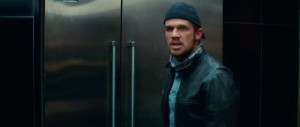 ******* The problem with all of the movies that Samaha/Davidson/Lerner/Amritraj produce is that they are just things, not movies. They are a series of interchangeable action thriller elements that vary based on cast and budget.
******* The problem with all of the movies that Samaha/Davidson/Lerner/Amritraj produce is that they are just things, not movies. They are a series of interchangeable action thriller elements that vary based on cast and budget.
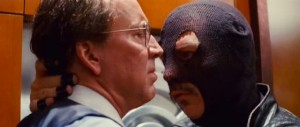 ******** The characters in Trespass have greater concussion/coma recovery powers than Steven Seagal in Hard to Kill, in which he manages to fight off bad guys just after waking up from a 6-year coma.
******** The characters in Trespass have greater concussion/coma recovery powers than Steven Seagal in Hard to Kill, in which he manages to fight off bad guys just after waking up from a 6-year coma.




“Nicolas Cage And The Temple Of Contractual Obligation” « Movie City News says:
April 14th, 2012
5:53 pm
[…] “Nicolas Cage And The Temple Of Contractual Obligation” […]
The Pope says:
April 14th, 2012
7:35 pm
Fantastic article. Hilarious and informative.
Homey the Pope says:
April 16th, 2012
9:59 am
I hope this works. redrum. The Mona Lisa is the daughter of Jesus. JFK was killed by Peter Lawford and LBJ. Marilyn died from an enema administered by RFK and Fred Otash. Believe. . . .
ScarJosPlentifulParts says:
April 20th, 2014
3:25 pm
The writing is articulate, insightful and
very funny. I LOVE this site!